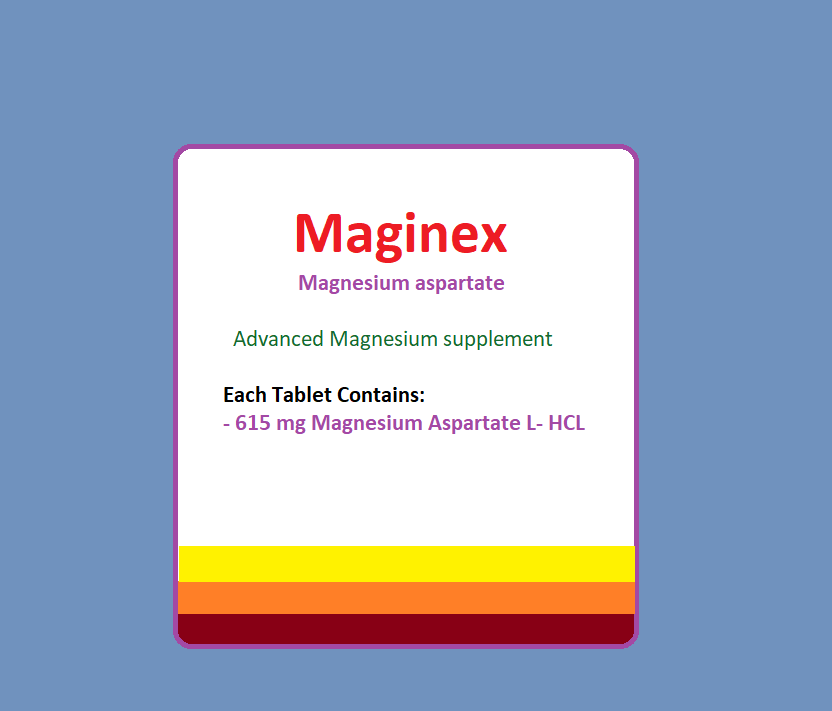Magnesium Aspartate (Maginex) or Magnesium L.Aspartate Hydrochloride is an enhanced oral formulation used as a dietary supplement to replace magnesium in patients who are deficient or at risk of developing a deficiency.
Magnesium L-aspartate hydrochloride Uses:
-
Dietary supplement:
- It is used as a dietary supplement in patients with magnesium deficiency such as those with malabsorption and nutritionally poor diet.
Magnesium Aspartate (Maginex) Dose in Adults:
Magnesium Aspartate (Maginex) Dose as Dietary supplement (dosage in terms of magnesium-L-aspartate hydrochloride salt):
- OTC labeling:
- Two tablets per day or one packet up thrice daily per oral.
Magnesium Aspartate (Maginex) Dose in Childrens:
Note: 1,000 mg of magnesium L-aspartate = 99.18 mg elemental magnesium = 8.16 mEq elemental magnesium.
Magnesium Aspartate (Maginex) Dose in the treatment of Hypomagnesemia:
-
Infants, Children, and Adolescents:
- Dose expressed as elemental magnesium:
- 10 to 20 mg/kg/dose orally up to 4 times a day.
- The usual adult dose is 300 mg up to 4 times per day.
- Note:
- In patients with severe deficiency or those requiring rapid correction, intravenous formulations should be preferred as excessive oral formulations may result in diarrhea, and correction with oral formulations may not be possible.
- Dose expressed as elemental magnesium:
Magnesium Aspartate Pregnancy Category: D (Previously labeled A)
- Magnesium crosses the placental barrier.
- The maternal serum levels may be equal to the fetus's.
- It was previously classified as pregnancy category A, meaning it is safe to use during pregnancy.
- However, it has been reclassified to pregnancy category D recently.
- This means it could be dangerous, especially if it is taken for prolonged periods or in high doses.
Use during breastfeeding:
- Magnesium can be found in human breastmilk.
- The first year of life, serum concentrations remain constant and are unaffected by maternal dietary intake or supplementation.
- Both breastfeeding mothers and non-lactating moms need magnesium the same way.
Dose in Kidney Disease:
- There are no dosage adjustments provided in the manufacturer's labeling.
- However, since magnesium is excreted via the kidneys, it should be used with caution in patients with kidney disease as it may accumulate resulting in toxicity.
Dose in Liver disease:
There are no dosage adjustments provided in the manufacturer's labeling.
Magnesium Aspartate (Maginex) Side effects:
-
Gastrointestinal:
- Abdominal cramps
- Diarrhea (excessive oral doses)
- Flatulence
- nausea and vomiting
- Ileus
-
Other:
- Weakness
- lethargy
- facial flushing
- hypotension
- difficulty in breathing
Contraindications to Magnesium Aspartate (Maginex):
There have not been any contraindications.
-
Constipation (self-medication, OTC):
- It should only be used occasionally to treat constipation.
- Side effects can be severe if the drug is used for too long or in excess.
- Patients at high risk for developing toxicities, such as kidney disease, should not use the drug without consulting a healthcare professional.
- Patients on sodium- or magnesium-restricted diets, patients who experience nausea, vomiting, abdominal pain, or both, as well as patients who have altered bowel habits or sudden onset of abdominal pain that lasts for more than two weeks, should consult a healthcare provider before taking OTC magnesium tablets.
- Patients who experience bleeding per rectum, or bowel movements that are not consistent with the treatment should stop using it and consult a healthcare professional.
-
Neuromuscular disease
- Patients suffering from myasthenia and other neuromuscular disorders should be cautious when taking the drug.
-
Renal impairment
- Patients with impaired renal function should be cautious when taking the drug. The drug can accumulate and cause toxic effects.
Monitoring Parameters:
- Monitor for the signs and symptoms of toxicity.
- Monitor magnesium levels especially in patients with kidney disease.
How to administer Magnesium Aspartate (Maginex)?
Packet:
- Mix the contents of one packet in water or juice.
Tablet:
- Avoid crushing or chewing the tablets.
Mechanism of action of Magnesium L-aspartate hydrochloride:
- Magnesium serves as a cofactor in many enzymes that are involved with protein and carbohydrate metabolism.
- Magnesium is a cofactor in at least 300 enzymes for proper functioning.
- It reduces blood cholesterol and acts on lipoprotein lipase enzymes.
- It acts on sodium/ potassiumATPases to promote polarization of neurons.
Absorption:
- Oral: Up to 30%
Excretion:
- Urine
- feces (as unabsorbed drug)
International Brand Names of Magnesium L-aspartate hydrochloride:
- Maginex DS
- Maginex
Magnesium L-aspartate hydrochloride Brand Names in Pakistan:
No Brands Available in Pakistan.







